What is ZetaChain? Discover the revolutionary Layer-1 blockchain platform that enables omnichain connectivity, cross-chain transactions, and the development of Omnichain dApps. Learn what can omnichain dapps do on zetachain and explore the potential of ZetaChain and its native token, ZETA, in this article.
What is ZetaChain?
ZetaChain is a Layer-1 blockchain that utilizes a Proof-of-Stake (PoS) consensus mechanism and is built on the Cosmos SDK and Tendermint engine. Its unique feature lies in its omnichain capabilities, allowing it to directly interact with any blockchain, including those that do not support smart contracts, such as Bitcoin.
ZetaChain achieves this through the use of omnichain smart contracts. These are specialized smart contracts that can be deployed on the ZetaChain platform and interact with different blockchains from a single point. This enables ZetaChain to offer several advantages:
- Simple and secure cross-chain transactions: Users can easily transfer assets between different blockchains without relying on intermediary bridges or centralized exchanges (CEXs).
- Low fees: This Layer-1 blockchain platform minimizes cross-chain transaction costs compared to traditional methods.
- Easy development of omnichain dApps: Developers can create dApps that operate across multiple blockchains simultaneously, expanding user reach and leveraging the strengths of each blockchain.
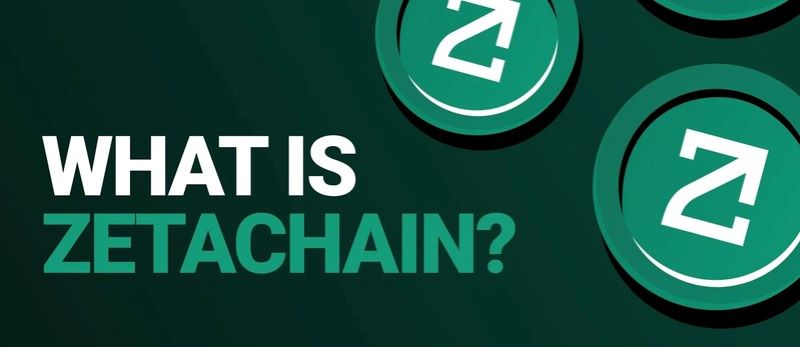
How ZetaChain works?
This Layer-1 blockchain platform operates on a decentralized network of nodes. Each node has three primary roles:
- Validator: Responsible for verifying transactions and maintaining consensus on the network.
- Observer: Monitors events on other blockchains and relays information to ZetaChain.
- Signer: Participates in the signing process to confirm cross-chain transactions, ensuring security.
ZetaChain employs a Proof-of-Stake (PoS) consensus mechanism in conjunction with Threshold Signature Scheme (TSS). TSS is an advanced cryptographic technique that enhances security by distributing private keys among multiple nodes. This ensures that no single individual or entity can completely control the network.
When a cross-chain transaction is initiated, observers monitor this event on the source blockchain. The information is then relayed to ZetaChain, where validators verify and execute the transaction. Finally, signers participate in the confirmation process to complete the asset transfer.
ZetaChain Message Passing is a crucial mechanism that enables omnichain smart contracts to interact with other blockchains. By sending and receiving messages, these contracts can access data and execute actions on different blockchains securely and efficiently.
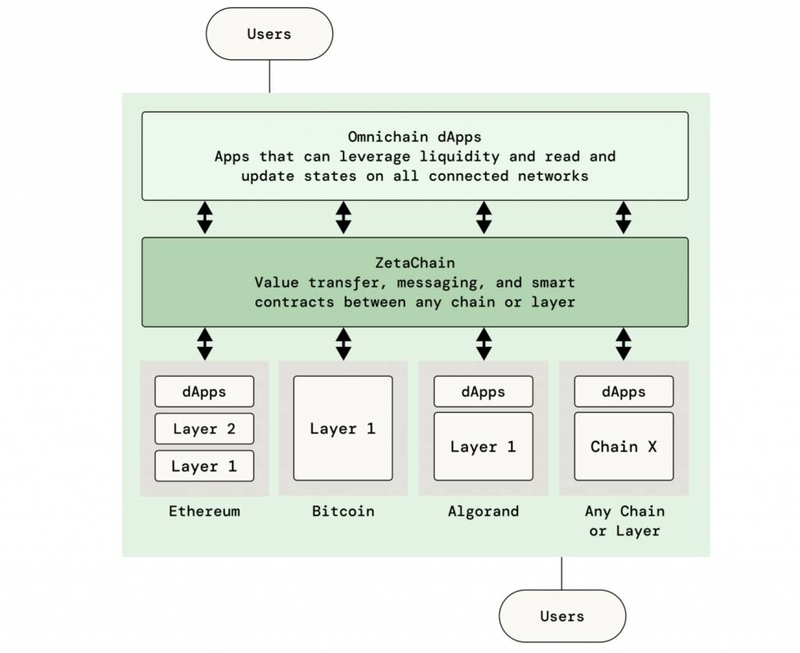
ZETA Token
ZETA is the native token of ZetaChain, playing a vital role in the operation and development of the ecosystem.
Tokenomics
- Token name: ZETA
- Blockchain: ZetaChain
- Token standard: ZRC-20
- Total supply: 2,100,000,000 ZETA
- Inflation: Estimated at around 2.5% per year after the first four years.
Token Allocation
- User Growth Pool (10%): 4.5% distributed at Token Generation Event (TGE), 0.2% monthly for the next 5 months, and the remainder unlocked gradually over 36 months. This pool aims to attract new users and encourage community growth.
- Ecosystem Growth Fund (2%): 1.5% TGE, the rest unlocked over 42 months. This fund supports projects built on ZetaChain and promotes ecosystem development.
- Validator Incentives (10%): Distributed per block over 4 years to encourage users to participate in staking and secure the network.
- Liquidity Incentives (5.5%): 3% TGE, the remainder unlocked over 48 months. This fund aims to provide liquidity for the ZETA token on exchanges.
- Protocol Treasury (24%): 2% TGE, the remainder unlocked over 36 months after the first 12 months. This fund is used to finance the project’s development and operational activities.
- Core Contributors (22.5%): Gradually unlocked over 36 months after 6 months from TGE. This reward is for the project’s core development team.
- Purchasers and Advisors (16%): Gradually unlocked over 36 months after 6 months from TGE. Allocated to investors and advisors who supported the project in its early stages.
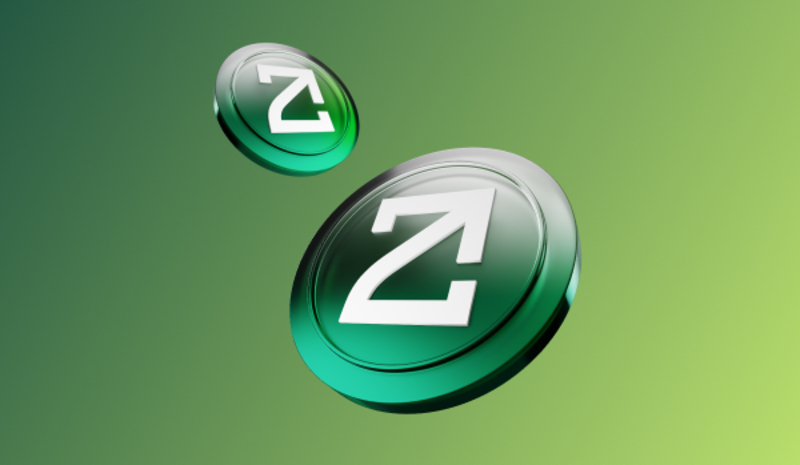
Functions of the ZETA token
- Staking and network security: Users can stake ZETA to become validators and participate in the consensus process, earning block rewards and transaction fees.
- Transaction fee payment: ZETA is used to pay fees for transactions on ZetaChain, including EVM (Ethereum Virtual Machine) transactions and cross-chain transactions.
- Governance and voting: ZETA holders have the right to participate in network governance, proposing and voting on policy changes.
- Facilitating cross-chain value transfer: ZETA is used for “burning” and “minting” on different blockchains, enabling value transfer without creating wrapped assets.
- Participation in liquidity pools: ZETA is used in liquidity pools to facilitate asset exchange between blockchains.
ZetaChain ecosystem
The ZetaChain ecosystem is rapidly growing with the goal of becoming a central hub for the entire blockchain world. The diversity and richness of this ecosystem are reflected in three key elements: decentralized applications (dApps), a vast partner network, and a vibrant developer community.
What can omnichain dapps do on zetachain?
ZetaChain supports a wide range of dApps spanning various fields, from DeFi and NFTs to GameFi and SocialFi. These dApps leverage ZetaChain’s cross-chain interoperability to deliver seamless user experiences and unique functionalities. Some notable examples include:
DeFi: Omnichain DEX (decentralized exchange) protocols, lending & borrowing platforms, yield farming, and stablecoins.
- Example: A lending application allows users to collateralize assets on one blockchain (like Ethereum) to borrow assets on another blockchain (like Bitcoin).
NFT Marketplace: Cross-chain NFT marketplaces enable the buying, selling, and trading of NFTs from different blockchains.
- Example: Users can purchase NFTs on Ethereum using stablecoins on BNB Chain.
GameFi: Blockchain games leverage cross-chain interoperability to create in-game items that can be used across different platforms.
- Example: Players can bring items earned in a game on Solana to use in a game on Polygon.
SocialFi: Decentralized social networks allow users to interact and share content across multiple blockchains.
- Example: Users can post on a SocialFi platform built on ZetaChain, and this content will be displayed simultaneously on other social networks.
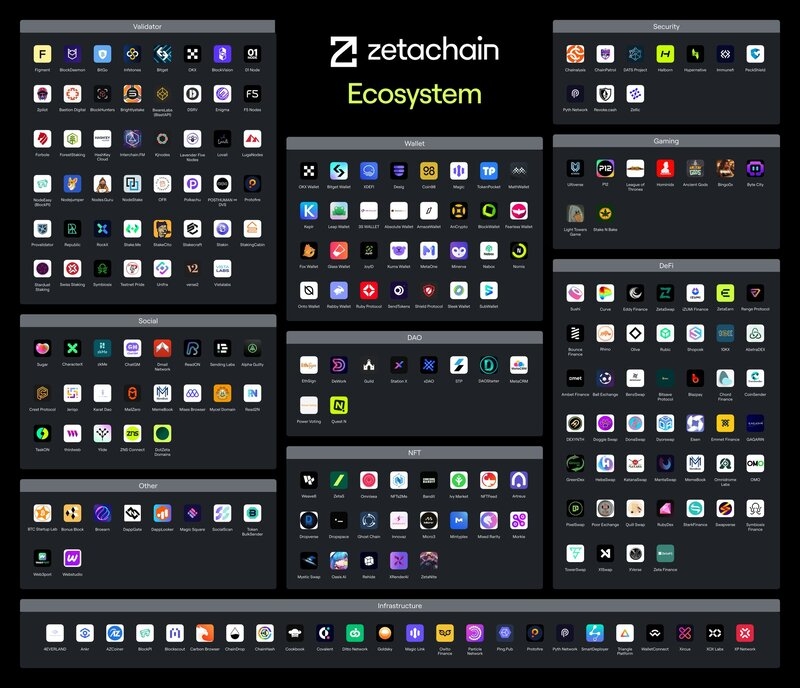
Extensive partner network
ZetaChain has established partnerships with over 200 organizations in the blockchain space. These partners play a crucial role in providing the services and infrastructure necessary for ecosystem development. Some key partner types include:
- Validators: Ensuring the security and stability of the network.
- RPC (Remote Procedure Call) services: Providing connections for dApps to interact with ZetaChain.
- API (Application Programming Interface) providers: Providing data and functionality for developers.
- Oracles: Providing real-world data to smart contracts.
- Wallets: Supporting asset storage and management on ZetaChain.
- Subgraphs: Providing indexed data for efficient querying.
- Explorers: Allowing users to track transactions and on-chain data.
Vibrant developer community
ZetaChain places the developer community at the core of its ecosystem development. The platform offers various programs and resources to support developers, including:
- Grant programs: Providing financial support for projects building dApps on ZetaChain.
- Documentation and tutorials: Providing detailed information on how to use and develop on its platform.
- Support community: Connecting developers through channels like Discord and Telegram.
Hackathons: Organizing programming competitions to encourage innovation.
ZetaHub
ZetaHub is ZetaChain’s primary explorer and portal. It provides users with tools to:
- Track transactions and on-chain data.
- Manage assets and wallets.
- Interact with dApps in the ecosystem.
- Participate in network governance.
With the continuous development of dApps, the partner network, and the developer community, the ZetaChain ecosystem is expanding and attracting the attention of many users and investors. This platform is on track to become a crucial connection hub in the blockchain world, driving the development of Web3 and DeFi.
Zetachain development roadmap and potential
The project is in active development with the goal of becoming the leading omnichain blockchain platform. The project’s roadmap focuses on three main directions:
Expanding Blockchain connectivity
ZetaChain already supports several popular blockchains like Bitcoin, Ethereum, BSC, Polygon, Avalanche, and more. However, the development team is working to expand connectivity to even more blockchains, including Layer-2 solutions and emerging networks. This will help ZetaChain truly become a “bridge” for the entire Web3 ecosystem.
Developing new features
ZetaChain continuously improves and adds new features to enhance interoperability, security, and user experience. Some features under development include:
- Improving cross-chain transaction performance: Increasing processing speed and reducing transaction costs.
- Upgrading omnichain smart contracts: Expanding programming capabilities and interaction with different blockchains.
- Developing tools and services to support developers: Providing SDKs, APIs, and detailed documentation to simplify the process of building omnichain dApps.
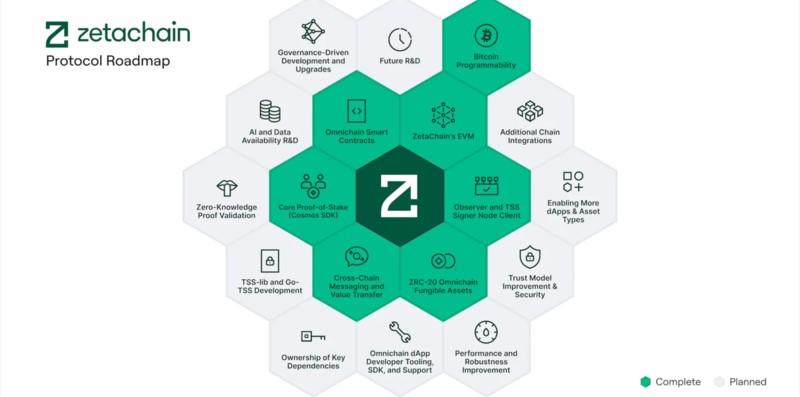
Building community and expanding the ecosystem
ZetaChain recognizes the importance of community in the project’s development. The team is actively building the community through activities such as:
- Organizing grant programs and hackathons: Supporting developers to build dApps on ZetaChain.
- Expanding partnerships: Collaborating with other projects and organizations in the Web3 ecosystem.
- Enhancing communication and marketing activities: Promoting ZetaChain to the global crypto community.
Growth potential
ZetaChain is considered a project with strong growth potential in the future due to the following factors:
- The growth trend of Web3 and DeFi: The demand for cross-chain interoperability is increasing, creating favorable conditions for the development of solutions like ZetaChain.
- Competitive advantage: The platform possesses breakthrough omnichain technology, allowing interaction with all blockchains, including those without smart contracts.
- Strong community: The platform is supported by a large and rapidly growing community of developers and users.
- Experienced development team: The platform is built by a team with extensive experience in the blockchain and cryptocurrency fields.
Comparing ZetaChain with other Cross-Chain solutions
Refer to the comparison table below:
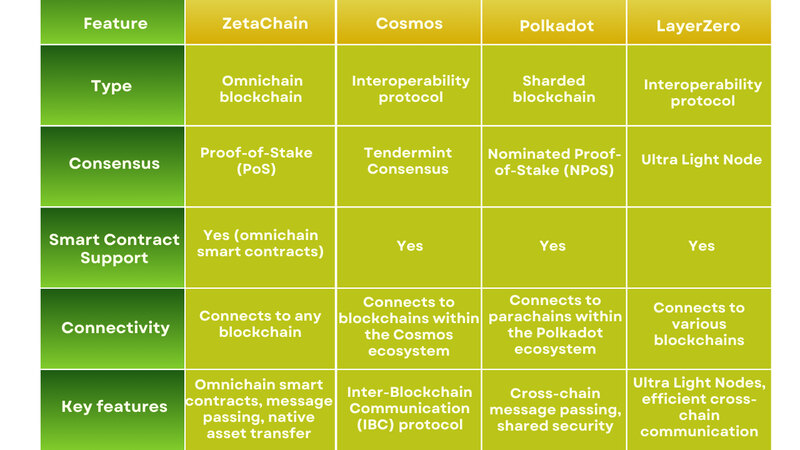
Potential and limitations of ZetaChain
ZetaChain is emerging as a promising solution for the multi-chain interoperability problem in the blockchain world. However, alongside its enormous potential, the project also faces certain limitations.
Potential of ZetaChain
- Superior interoperability: It allows for secure and efficient connection of different blockchains, including those that do not support smart contracts like Bitcoin. This opens up opportunities for building omnichain applications with rich features and seamless user experiences.
- Comprehensive solution: It is not merely a bridge but a complete Layer-1 blockchain with features like omnichain smart contracts, multi-chain asset management, and high-speed transactions.
- High security: It is built on the Cosmos SDK and Tendermint Consensus, inheriting the security and stability advantages of these two technologies.
- Growing community and ecosystem: It is attracting community interest, and many projects are being built on the platform. This creates a solid foundation for future development.
- Experienced development team: It is led by a team with years of experience in the blockchain and technology fields.
Limitations of ZetaChain
- Project is still young: It is still in its early stages of development, so there are potential technological and market risks.
Intense competition: It faces competition from many other cross-chain projects like Cosmos, Polkadot, LayerZero, etc. - Scalability: Although ZetaChain has high transaction processing speed, it still needs to prove its scalability to meet the growing demands of the multi-chain ecosystem.
- Dependence on Cosmos development: It is built on the Cosmos SDK, so it depends on the development and stability of the Cosmos ecosystem.
ZetaChain is a promising omnichain blockchain platform, offering a solution to the cross-chain interoperability problem in Web3. With its breakthrough omnichain technology, multifunctional ZETA token, and rapidly developing ecosystem, ZetaChain is expected to play a crucial role in building a unified and more accessible blockchain network.
Hopefully, this article from Blockchain Global Network will help you better understand ZetaChain before deciding to invest in it. Wish you success on your investment journey.

RELATED POSTS
What are the key blockchain technology advancements 2025
The world of decentralized technology...
Kishu Inu Coin: A guide to investing in this Meme Token
Discover Kishu Inu Coin, a...
What is a smart contract and how does it work
Imagine a vending machine. You...
How does DALLE work? A Comprehensive guide to AI Art generation
How does DALLE work? This...
ABLY Airdrop: A comprehensive guide on how to participate
In the rapidly growing cryptocurrency...
MicroStrategy Short Squeeze: Opportunities in the Crypto
The MicroStrategy short squeeze is...
BoxBet Airdrop – Your Ultimate Guide to Earning BXBT Tokens
The BoxBet Airdrop is making...
A complete beginner guide to crypto wallets
Entering the world of cryptocurrency...
Cryptocurrency Unveiled: Unlocking the Mysteries Beyond Blockchain
How is cryptocurrency different from...
Keith Grossman: The journey from media to finTech
Discover the life and career...
What is Tokenized Real Estate? – Unlocking Global Investment Opportunities
What Is Tokenized Real Estate?...
Unveiling the secrets of blockchain technology meaning
What if the key to...
PeckS Airdrop – Strategy to Receive $PeckS Airdrop
Participating in the PeckS Airdrop...
Examples of Secure Blockchain Implementations: Unveiling Industry Innovations
Examples of secure blockchain implementations...
Is Ledger open source? 95% of Ledger’s software is open source
Wondering “Is Ledger open source?”...
What is blockchain technology and How does it work?
What is blockchain technology and...